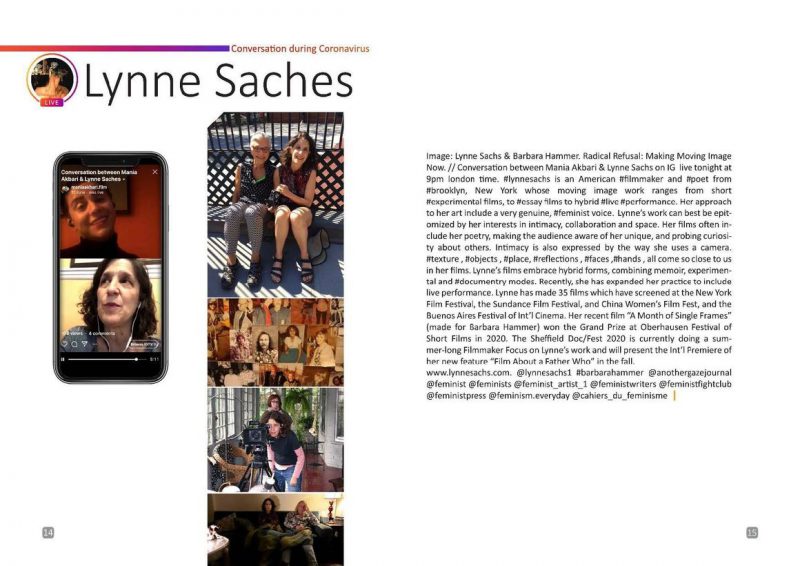
Conversation With 100 Artists, 100 Interviews During Post Coronavirus
ABOUT THE PROJECT:
Let’s start with Decartes’ famous quote: I think, therefore I am. Although Decartes did not put much value on the body, he did not deny the body and he used his imagination and emotion to reason for the body’s existence. Kant also considered the body outside of time and space. Merleau-Ponty believes that phenomenal perception is a bodily experience rather than a mental one. To him, we are embodied documents; The body becomes contextualized in this world. It is our outlook to the world, as well as our anchorage to the world. His famous saying is: “For seeing, one has to look.”Michelle Foucault in his Ideal Body (1966) says: This body is light, transparent, and unaffiliated. Nothing is as thing as the body. It runs, it interacts, it lives, it desires, and it without any resistance allows my desires to pass through it. Yes, the day I have pain, when a hole is dug inside my abdomen, when it gets blocked, then swallowed, when my throat and chest are filled with pain, when deep inside my mouth a tooth hurts, this is when I am not weightless and free. I then become a thing, a dreamed architectural construction that is now a ruin. In fact, there is no need for magic or spells, for spirit and death. In order for me to be opaque and transparent, visible and invisible, life and thing, and for me to be ideal, all I need is to be a body.Our bodies are meaningful political forms which go through transformations throughout their lifetime. In a way, our bodies have gone beyond the skin, meat, and bones. Our bodies revive a cultural context influenced by the surrounding world inside and outside. The body not only influences the shape of our agencies and the human events but is also influenced by the same factors.We are in our bodies but in distance. The body’s cultural meaning in each geography is different according to the history of that same geography including its past, forms, and architecture. The body’s contemporary environment creates a different communication language. We are alienated from our very own bodies and we feel our existence through touching another. We understand the meaning of body through touching another body.Our bodies are stolen and confiscated from us by the virus phenomena. Our bodies are captivated and imprisoned by our fear of death. This collective experience has expanded our definition of relationship and our concept of elimination. The presence of body in relation to another body, looking in each other’s face, and touching one another is eliminated from the body’s daily life. In order to understand existence, we refuged to sound, hearing, and speech.This project is made of conversations with different artists whose works explore the experiences our contemporary moment and capture the feeling of being, as well as constant search for recycling the body. The project is inspired by the famous Decartes’ saying: I think, therefore I am. We used Instagram as a platform to think “live” together, and to communicate those thoughts to bodiless “live” listeners to recycle their bodies together. This project will become a book in both English and Farsi to record the memories of bodilessness in the moving times of COVID-19 for the future generations. The aim is to make possible to read the thoughts of the bodies, as well as to make sense of the transformation of their identities during this time.

Mania Akbari (b. Tehran, 1974) is an internationally acclaimed artist and filmmaker. Her provocative, revolutionary and radical films were recently the subject of retrospectives at the BFI, Lon- don (2013), the DFI, Denmark (2014), Oldenburg International Film Festival, Germany (2014), Cyprus Film Festival (2014) and Nottingham Contemporary UK (2018). Her films have screened at festivals around the world and have received numerous awards including German Independence Honorary Award, Oldenberg (2014), Best Film, Digital Section, Venice Film Festival (2004), Nantes Special Public Award Best Film (2007) and Best Director and Best film at Kerala Film Festival (2007), Best Film and Best Actress, Barcelona Film Festival (2007). Akbari was exiled from Iran and currently lives and works in London, a theme addressed in ‘Life May Be’ (2014), co-directed with Mark Cousins. This film was released at Karlovy Vary Film Festival and was nominated for Best Documentary at Edinburgh International Film Festival (2014) and Asia Pacific Film Festival (2014). Akbari’s latest film ‘A Moon For My Father’, made in collaboration with British artist Douglas White, premiered at CPH:DOX where it won the NEW:VISION Award 2019. The film also received a FIPRESCI International Crit- ics Award at the Flying Broom Festival, Ankara.
